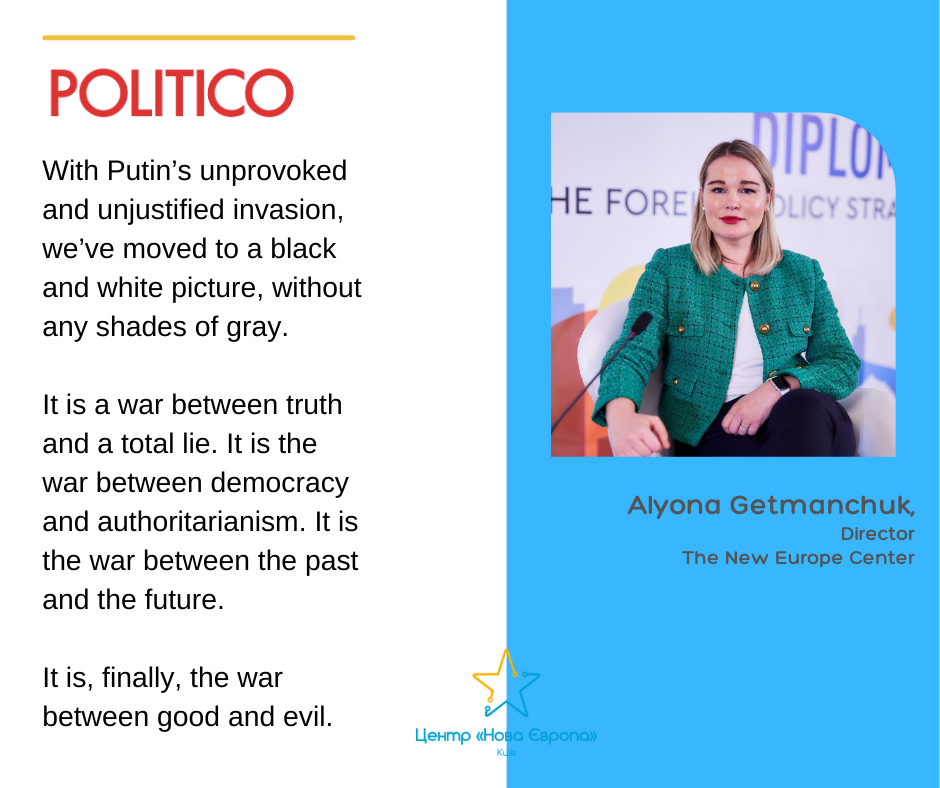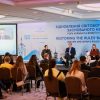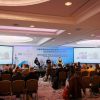Op-ed by Alyona Getmanchuk, Director of the New Europe Center wrote for the leading European media POLITICO.
As a foreign affairs analyst, I believed Vladimir Putin’s large-scale war against Ukraine was imminent. But as a Ukrainian with a family living in Kyiv, I struggled to accept this worst-case scenario.
For months, I had warned the West to speed up military assistance for Ukraine and impose sanctions on Russia in advance. I had been developing scenarios for how Putin might act and what the West should do to increase the cost of his aggression. Yet I failed to develop a detailed plan for my family if the worst case came to pass. At our think tank, we were totally focused on preventing a war, not on how to act in wartime. We were fairly sure that even though war was imminent, it was not unavoidable.
That’s why, despite having my “go bag” packed at least a week before the invasion, I was unable to convince myself to move my family to a safer place. (Moreover, fleeing Kyiv before the attack started was considered by many in the capital as a sign of weakness or even a sort of betrayal.)
That’s why on the last peaceful day, Feb. 23, I was routinely scheduling meetings for Feb. 24, including one with a high-level government official, and preparing for debates our think tank was organizing for later in the week on how China benefits from the Russian crisis. Yet the air in Kyiv that night was heavy with anxiety and horror. The last words I heard on the night of the 23rd were my husband’s verdict: “Tomorrow the war will start.”
Even for us Ukrainians — who have been living with Putin’s war against Ukraine for eight years and realized Putin could come back at any point to put the country under Moscow’s total control — it was a real shock to be awakened at 5 a.m. on Feb. 24, 2022, in the 21st century in the middle of Europe, by explosions from missile strikes. Air raid sirens urged us to proceed to the shelter. The war is always somewhere distant until one day it comes directly to your house.
Ukrainians are used to shades of gray. They’ve long held an ambiguous status as a European democracy haunted by its Soviet authoritarian past, broadly sharing the values and principles of the European Union and NATO but not yet welcome in those clubs. They’ve also lived with the ambiguity of a war that has gone on for eight years yet didn’t always affect daily life in all parts of the country. Now, for us, everything has become black and white. It is a war between truth and a total lie. It is the war between democracy and authoritarianism. It is the war between the past and the future. It is, finally, the war between good and evil.
My hope is that the West, too, will recognize this black and white reality, agreeing to unambiguously support Ukraine in the coming days of war and then unequivocally welcoming it into the community of democracies in which our country has surely earned a place.
During the first couple of minutes last Thursday morning, my mind simply didn’t want to accept what I was hearing. But when I continued to hear explosions and frightened neighbors knocking on our door, I understood that Putin had launched the worst-case scenario. Any remaining myths of Putin as a rational politician just playing a madman were crushed.
I stayed in Kyiv two nights under missile strikes and air raid sirens, constantly checking on the safety of relatives, colleagues and friends. My beautiful neighborhood in Kyiv in half a day turned into a ghost town — no people, no cars. And then — still reluctant, but worrying for the safety of my child — I made the 30-hour drive to a safer place with a baby sleeping on my lap. We encountered endless lines at checkpoints newly established by the Ukrainian towns and missile strikes against the blue sky. I never imagined myself a refugee and still very much regret that I had to flee Kyiv. But my heart and thoughts remain there. I fiercely believe that I will be able to return to my city, my apartment and my previous life.
It’s easy to despair in a situation like this, but it has been remarkable to see that Ukrainians’ determination and hope are stronger than the forces seeking to destroy our spirit and our nation. Ukrainians want to win this war not only to survive as a state, but to ensure Putin can never again attack either Ukraine or any other democratic state. From the start of this large-scale war, Ukrainians have made clear that they are not just fighting for their country, but in fact defending Europe.
Many in Europe similarly see Ukraine as a front line in a larger battle: I recall a military strategist in Warsaw telling me years ago “For us, it’s crystal clear: Any Russian soldier killed in Ukraine would never come to Poland.” These days there is a growing feeling that by fighting against the Russian army we are defending the whole democratic world.
Ukraine’s leadership, military and society have been underestimated, both by the adversary and by our partners. In fact, many Ukrainians themselves underestimated their own ability to meet the enemy so fiercely — before the enemy appeared on our land with ballistic missiles and tanks. Some did not expect that so many people would enroll in the territorial defense forces; in many regions, you have to stay in line for as long as 3½ hours to get into induction centers. As the latest opinion polls show, 80 percent of Ukrainians are ready to defend their country with arms in their hands, a significant increase from before the invasion. Clearly, the fear of Ukraine under Russian occupation is much greater that the fear of resisting the would-be occupier.
If Ukrainians up until last week had less than total confidence in their country’s ability to resist, they had even less faith in their political leadership. President Volodymyr Zelenskyy has for years been committed to peace negotiations and was in fact desperately seeking talks with his Russian counterpart. Unlike other Ukrainian politicians, he avoided criticizing Putin in person, apparently out of a desire to leave room for a diplomatic solution. There were doubts that he would be as committed to defending Ukraine as he was to peace talks.
Many skeptics of Zelenskyy also worried about his well-known “people-oriented” policy: He constantly emphasized the plight of ordinary people in a way that suggested he might seek to avoid civilian casualties even if it meant agreeing to Putin’s ultimatums. But in fact, Zelenskyy did a great job, first by not responding to Putin’s provocations and providing the pretext many observers thought Putin was seeking (how naïve they were!). Second, when the war started, he, surprisingly to many, turned out to be an effective, fearless commander in chief. Support for Zelenskyy reached a record 93 percent in recent days. The fact that he is Putin’s No. 1 target in this war and that for him — not only for Ukraine as a nation — this war is literally a matter of life and death only adds to sympathy for Zelenskyy among Ukrainians and around the world.
Large-scale unity is replacing Ukraine’s once-fractious politics. Even the fiercest political opponents — like Zelenskyy and former President Petro Poroshenko — immediately buried the hatchet when the invasion started. There is a clear understanding that there may be many political opponents, but there is only one true enemy and his name is Putin.
In the weeks and months to come, Ukraine will, of course, find a more sympathetic audience as it bids for EU membership and fights for its right to be invited to NATO without Putin’s approval. But it’s important to be clear that Ukraine’s qualifications to join these communities do not come from Putin’s invasion. They come from the democratic transformations that prompted the invasion. Putin invoked the worst-case scenario because he is desperately losing Ukraine. Other sources of leverage Russia has successfully used in the past — political, economic, energy, cultural and religious efforts to pull Ukraine into its orbit — lost much of their power in the course of Putin’s eight years of war against Ukraine. The only real card he had left to play was the military one. In fact, I can’t exclude the possibility that Putin decided to play this card now because he understands that in five or 10 years — given Ukraine’s cooperation with NATO members on modernizing its armed forces, given the slow, but real democratic transformations making the country more resilient — his military leverage will become even less significant. Putin’s invasion should be seen as his recognition of Ukraine’s achievements — the same achievements that qualify it to join the community of European democracies.
Right now, facing the large-scale Russian invasion, what we expect from the world is large-scale punishment for Russia and large-scale support for Ukraine. Ukrainians are grateful for the decisive actions taken recently by the U.S., the EU, NATO and G-7, but it remains the case that most of those actions should have been taken in the past eight years, after Putin’s illegal annexation of Crimea.
There is still a long, urgent to-do list. This list is well-known in world capitals; I will just underline that Ukrainians want to see steps like an oil and gas embargo for Russia, effective execution of the freeze on Russia’s Central Bank, full-scale disconnection from SWIFT, a true ban on high-tech exports, further flight restrictions and freezes on new visas to Russian citizens. In short, this time Putin’s Russia has indeed to pay with blood and money.
There should be, if not a traditional no-fly zone over Ukraine (we understand NATO’s fear of direct military confrontation) a creative equivalent along the lines of a humanitarian no-fly zone. Short of direct engagement, NATO should urgently strengthen Ukraine’s air capabilities with advanced air defense systems and fighter jets, as well as provide weaponry for territorial defense forces, ammunition, artillery, drones. Ukraine also seeks expanded macro-financial assistance to its economy, a temporary payments freeze for existing Ukrainian debts and more humanitarian and medical assistance.
Finally, the EU should approve Ukraine’s bid for membership, which would put to rest any of Putin’s illusions about returning Ukraine to Russia’s sphere of influence.
As a think tanker, I am trained to see nuance. But with Putin’s unprovoked and unjustified invasion, we’ve moved to a black and white picture, without any shades of gray. Ukraine has become an unambiguous symbol for everything that democratic Europe stands for.
Ukrainians have proved many times in our history, and are proving again now, that they can fight hard. But this week, and in the weeks to come, Ukrainians are also proving that they can dream big. We can only hope that the West will start fighting hard and dreaming big with us — not about delaying defeat, but about winning this war.








